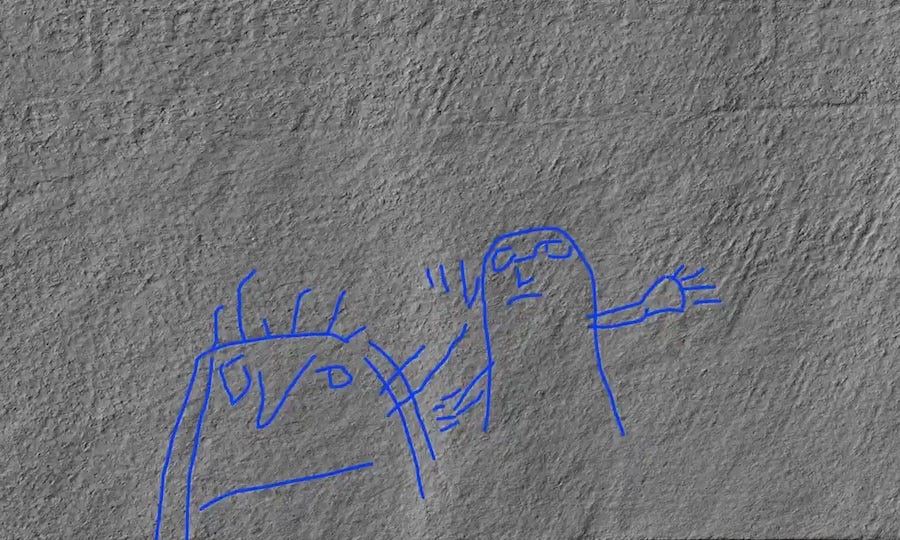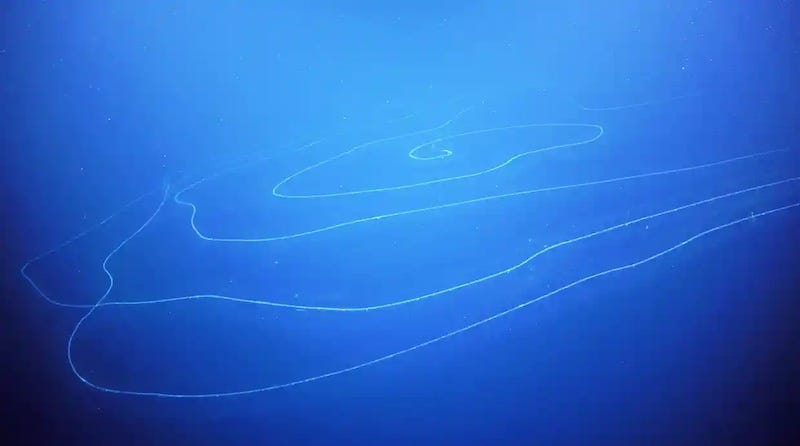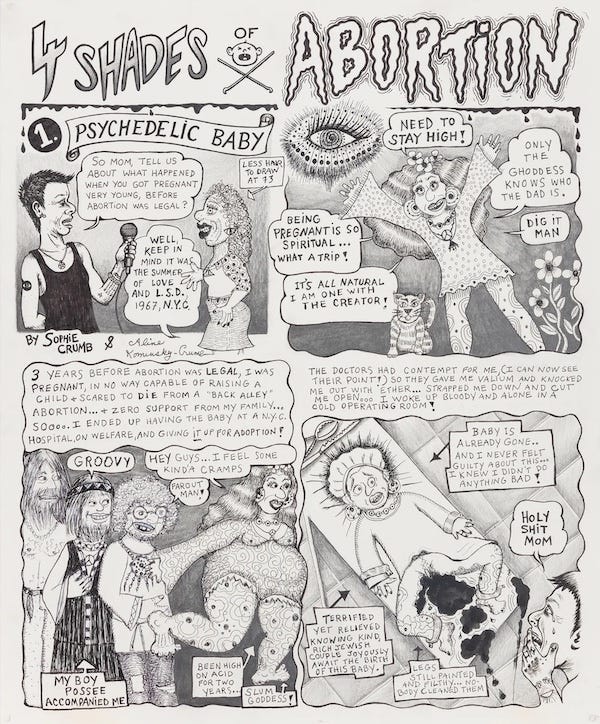The Weird Times: Inner Monologues and Desultory Reporting from Outer Spaces
Issue 134, December 4, 2022 (V3 #30)
History says, don’t hope
On this side of the grave.
But then, once in a lifetime
The longed-for tidal wave
Of justice can rise up,
And hope and history rhyme.
—from “The Cure at Troy,” Seamus Heaney
"In the end we will conserve only what we love, we will love only what we understand, and we will understand only what we are taught." —Baba Dioum
Politics
What Georgia Teaches Us About Voter Suppression, Marc Elias, Democracy Docket, 11/29/22: “More fundamentally, however, voter suppression must be judged by the effect on the voters, not the subjective intent of government officials.”
The Authoritarian Right Is Regrouping: In Moscow, Mar-a-Lago, and beyond, desperate men are mobilizing anyone they can to help them regain power, Tom Nichols, The Atlantic, 11/28/22
Did Big Tech antitrust pick the wrong target? Everyone thought Facebook was the 800-pound gorilla. Maybe it was Apple all along, Noah Smith, Noahpinion, 11/29/22
Their wealth was built on slavery. Now a new fortune lies underground: In Virginia, the land still owned by the Coles family could yield billions from uranium. Does any of that wealth belong to the descendants of the enslaved? Julie Zauzmer Weil, Washington Post, 12/1/22
In Praise of the Worker-Owned Company (OR: What to Do About Simon and Schuster): A Few Suggestions For Corporate Publishing, Nick Fuller Googins, LitHub, 11/29/22: “…let the employees of Simon & Schuster purchase Simon & Schuster. They do the work, after all. Let them own their company. Let them call the damn shots.”
The Most Consequential First Amendment Case This Term: "303 Creative v. Elenis" isn’t about LGBTQ rights, as many people believe it to be, but about what constitutes speech, David French, The Atlantic, 12/2/22: “…the precise issue in the case is simple: “whether applying a public-accommodation law to compel an artist to speak or stay silent violates the free speech clause of the First Amendment.” But behind that simple statement is hidden a frankly bizarre legal doctrine, one that the Supreme Court has to address or it threatens the very nature of artistic freedom itself.”
What’s Really at Stake in a Politically Charged Supreme Court Case on Elections, Ian MacDougall, ProPublica, 11/30/22: “Supporters of the independent state legislature theory rely chiefly on selective readings of earlier Supreme Court cases and attempt to play to the originalist preferences of some conservative justices.”
The court’s supremely obtuse response to its ethical problems, Ruth Marcus, Washington Post, 11/29/22: “If the patient isn’t willing to take steps to heal itself, others will step in to administer the necessary medicine.”
“Fuck Biden,” “Don’t Tread on Me,” and a Wisconsin Death trip for our Times: The author knocks on the doors bearing the darkest symbols, behind which lie guns, ammo, antisemitism, antiabortion dogma—and a belief in the coming civil war, Jeff Sharlet, Vanity Fair, 11/30/22
Woman, Life, Freedom: The Origins of the Uprising in Iran: The massive protests in Iran, fueled by the audacity of young women and children, are rooted in over a century of struggle, Janet Afary, Kevin B. Anderson, Dissent, 12/2/22
Beijing's tragic COVID dilemma, Adam Tooze, Chartbook, 12/2/22: “A dictator’s embarrassment is generally a cause for celebration. But what if it also threatens a national tragedy and a bona fide global problem?
It's a hard life
It's a hard life
It's a very hard life
It's a hard life wherever you go
If we poison our children with hatred
Then, the hard life is all they'll ever know
—from “It’s a Hard Live Wherever You Go,” Nanci Griffith
Books and Culture
Neil Young Embraces Imperfection: The singer-songwriter discusses his new album with the theme of climate change, his friendship with Rick Rubin, and recording melodies on his flip phone, Amanda Petrusich, The New Yorker, 11/27/22
Kathy Acker’s Art of Identity Theft: By stealing the work of others, the author remade herself—and reinvented what autobiographical writing could be, Maggie Doherty, The New Yorker, 11/28/22: “I realize that all my life is endings. Not endings, those are just events; but holes. For instance when my mother died, the “I” I had always known dropped out. All my history went away.”
The Radical Hope of Patti Smith: As the artist, writer, and musician gears up for a new show, she looks back on an astonishing 50-year career and what drives her forward, Chloe Cooper Jones, Harper’s Bazaar, 11/28/22: “Now I know what nothing is.”
Walter Mosley on Ta-Nehisi Coates’s Black Panther: A Nation Under Our Feet: "This permission to imagine, I believe, is the gift of all comics but T’Challa, the Black Panther, was a special gift to many young black people. Rather than a creation for us, it was a manifestation of our underlying dreams,” Walter Mosley, CrimeReads, 11/29/22
A decade after her death, this bawdy Latina lesbian rebel poet is overdue for recognition, Christopher Soto, LA Times, 11/27/22: “I am a fat, slightly bearded lesbian….I am a writer.”
Christine McVie: The songbird behind some of Fleetwood Mac's greatest hits, Ian Youngs, BBC News, 12/1/22 Listen to one of her last: Songbird
Remembering the Artist Aline Kominsky-Crumb, a Trailblazing Funny Woman: Her comics are intimate, self-deprecating, and liberating. Her personality was larger than life, Françoise Mouly, The New Yorker, 12/2/22
How Indigenous Architects, Artists, and Activists Are Using Design to Restore Tribal Sovereignty: “We are not subjects, we’re citizens,” Abigail Glasgow, Architectural Digest, 11/29/22: “According to Tammy Eagle Bull, the first Native American in the U.S. to become a licensed architect, conflating the needs of Indigenous peoples is “the mistake many architects make when trying to work with tribes, often coming to a tribe with their interpretation.””
On Preserving the Lenape Language (and Trying to Get Face Time with an NYC Mayor) Margie Cook in Conversation with Preservationist Jim Rementer, LitHub, 11/28/22.
What the Analog Inventions of the 20th Century Teach Us About the Digital Inventions of the 21st: From Filing Cabinets to VR, Pneumatic Tubes to AI, Rex Woodbury, Digital Native, 11/30/22
Woman’s name and tiny sketches found in 1,300-year-old medieval text: Old English name, Eadburg, repeatedly scored into manuscript had remained hidden for more than 12 centuries, Donna Ferguson, The Guardian, 11/28/22

We Need Diverse Books Launches #BooksSaveLives Initiative Against Censorship, Claire Kirch, Publishers Weekly, 11/29/22: “The book that was most challenged and banned this past year is Gender Queer by Maia Kobabe.”
Cognitive Dissonance, Scott Galloway, No Mercy/No Malice, 12/2/22: “…self-serving bias. This is where you irrationally take credit for wins but blame failures on something else. (Common among narcissists and assholes.)”
Connecticut’s tribal nations, Department of Education partnering to develop Native American studies curriculum: ‘To tell our true, tragic, yet also very wonderful history,’ Alison Cross, Hartford Courant, 11/30/22
In a New Book, Annie Proulx Shows Us How to Fall in Love with Wetlands: These vital carbon sinks and havens for biodiversity, rarely encountered, are disappearing three times faster than forests, Kiley Bense, Inside Climate News, 12/3/22 Book: Fen, Bog and Swamp: A Short History of Peatland Destruction and Its Role in the Climate Crisis
On the Genius and Contradictions of Etheridge Knight: “Here’s a poet who possessed a genius for surviving the harsh realities of America,” Yusef Komunyakaa, LitHub, 12/2/22: “While some may see Etheridge as a trickster straight out of African American folklore or central-casting, decked out in his blue denim overalls, we could also rightfully say that he was an intellectual survivalist who knew the sharp turns of urban America.” Book: The Lost Etheridge: Uncollected Poems of Etheridge Knight, edited by Norman Minnick.
“Song of the Homeless”
I am not Br’er Boll Weevil
Looking for fresh cotton;
I am not the red umbrella
On the subway seat, forgotten
By a lady in a fashionable suit
I am not a Wall Street broker
Selling junk bonds, nor a junkie
Selling toothpaste on 42nd St.
I am a Homeless Person in this
Land of the Free, a Homeless slave
In this Land of the Brave
—Etheridge Knight
Science and Environment
Corn Nourishes the Hopi Identity, but Climate-Driven Drought Is Stressing the Tribe’s Foods and Traditions: Most Hopi grow corn with only the precipitation that falls on their fields, but two decades of drought have some of them testing the waters of irrigation and hoping they can preserve other customs with their harvests, David Wallace, Inside Climate News, 11/27/22
Discovered in the deep: is this the world’s longest animal? A submersible off the coast of Western Australia chanced upon an 45-metre-long deep-sea siphonophore arranged in a feeding spiral, trailing its deadly tentacles, Helen Scales, The Guardian, 11/30/22

Where did the PFAS in your blood come from? These computer models offer clues: New research could help pinpoint “forever chemicals” exposure — giving communities a roadmap for cleanup and individuals direction on what to avoid, Marlowe Starling, Environmental Health News, 11/28/22
Pink snow is a red flag for the West’s water: Researchers are trying to understand what drives snow algal blooms and how they could alter water supplies, Kylie Mohr, High Country News, 11/29/22
Officials fear ‘complete doomsday scenario’ for drought-stricken Colorado River, Joshua Partlow, Washington Post, 12/1/22
Soil Health Is Human Health: Soil-health pioneers David Montgomery & Anne Biklé discuss the nutrient benefits of regenerative practices, and how they may also be a solution to drought in the West, Naomi Starkman, The Conversation, 12/1/22
Pliocene-Like Monsoons Are Returning to the American Southwest: As carbon concentrations rise, conditions are becoming more like they were 3 million years ago, when the area was wetter and the rain was heavier, Jim Morrison, Wired, 11/30/22
Shifting to an EU plant-based diet would make up for exports lost to Ukraine war: A new study finds that shifting away from meat, dairy, and sugar would release tons of crops for other uses—replacing almost all crop exports from Ukraine and Russia, Emma Bryce, Anthropocene, 11/25/22
What to Do When the Recovery of One Species Puts Another at Risk? In Antarctica, rebounding fur seals are threatening the frozen continent’s fragile flora, Sean Mowbray, Hakai, 11/30/22: “Inadvertently or not, humans have been picking ecosystems’ winners and losers for millennia. As populations recover from historical exploitation and struggle to adapt to already altered environments that are further changing because of anthropogenic warming, taking a hands-off approach is seeming less and less viable.”
Ancient virus revived from Russian permafrost after 48,500 years – study: The virus, a Pandoravirus, had been lying dormant in Russia's permafrost. The study sheds light on the dangers of climate change awakening prehistoric diseases from permafrost, Staff, Jerusalem Post, 11/29/22
How Dogs Explore the World Through Smell: The Role of the Senses in Animal Consciousness, Jules Howard, LitHub, 11/28/22
A Proactive Way to Detect Cancer at Its Earliest Stages: Medtech firm Earli is working on a way to make tumors announce themselves as they appear—and even provide directions to where they are in the body, Grace Browne, Wired, 12/2/22
Amid the Sprawl, a Long Island Prairie Makes a Quiet Comeback: Tucked into quintessential suburbia, the Hempstead Plains Preserve is a small sliver of the grassland that once covered a vast area of Long Island. New research shows that thoughtfully planted yards and gardens can bolster the biodiversity in such urban wildland fragments, Janet Marinelli, Yale Environment 360, 12/1/22
An ecological rule breaker shows the effects of climate change on body size: The Northern Treeshrew defies two of the most widely tested ecological “rules” of body size variation within species, a new study finds, Mike Cummings, Yale News, 11/29/22
Vermont’s dairy farms recede, giving way to shrimp, saffron and new ideas: As climate and other factors make milk and maple syrup harder to produce, a raft of new crops and farm businesses see an opportunity, Laura Reiley, Zoeann Murphy, Washington Post, 12/2/22
Physicists Create a Holographic Wormhole Using a Quantum Computer: The unprecedented experiment explores the possibility that space-time somehow emerges from quantum information, even as the work’s interpretation remains disputed, Natalie Wolchover, Quanta, 11/30/22
Beyond solar: Here’s what the clean energy future might look like: Five scenes show how direct air capture, carbon capture, and hydrogen hubs could fit into the U.S. economy, Emily Pontecorvo, Grist, 12/1/22
We came for salvation
We came for family
We came for all that's good that's how we'll walk away
We came to break the bad
We came to cheer the sad
We came to leave behind the world a better way
—from “Salvation Song,” Avett Brothers, by Robert William Crawford/Scott Yancey Avett/Timothy Seth Avett
Birds
World’s heaviest flying bird uses plants to self-medicate, scientists say, Hafsa Khalil, CNN, 11/23/22 Caption: Great bustards eat corn poppies for their medicinal properties.
CT scans of toothed bird fossil leads to jaw-dropping discovery: Dating back more than 65m years, specimen’s mobile palate challenges understanding of avian evolution, Nicola Davis, The Guardian, 11/30/22: “The team have labelled the newly discovered animal Janavis finalidens in reference to the Roman god that looked both backwards and forwards, and a nod to the animal’s place on the bird family tree.”
Top-flight recovery: the inspiring comeback of the California condor: Nearly extinct in the 1980s, an intensive programme to reverse the bird’s decline has made it a conservation success story, Patrick Greenfield, The Guardian, 11/28/22
Cities are killing birds. Activists and architects have solutions, Richard Mertens, Christian Science Monitor, 11/29/22: “The problem, then, is twofold: lights and glass.”
Chile, the country of birds: Javiera Ferreyra, Audubon, 12/1/22: “Today we are not only valuing our birds: we are moving from words to actions.”
Tufted Titmouse Takeover: NYC Is For The Birds: Experts say Tufted Titmice usually travel in pairs, Matt Troutman, Patch, 11/30/22
This is a big week for birthdays. Dec 4: Thomas Carlyle, Samuel Butler, Rainer Maria Rilke, Herbert Read; Dec 5: Christina Rosetti, Nunnally Johnson, Joan Didion, Calvin Trillin; Dec 6: Joyce Kilmer, Osbert Sitwell, Ira Gershwin, Peter Handke; Dec 7: Willa Cather, Noam Chomsky, Pearl Cleage; Dec 8: Horace, Padraic Colum, James Thurber, Delmore Schwartz, Mary Gordon; Dec 9: John Milton, Dalton Trumbo; Dec 10: George MacDonald, Emily Dickinson, Nelly Sachs, Rumer Godden, Carolyn Kizer. Happy Birthday All!
Birthday of but a single pang
That there are less to come --
Afflictive is the Adjective
But affluent the doom –
—Emily Dickinson
Some recommended books from City Point Press
The Ivy Hero: The Brave Life of Sergeant William Shemin, Sara Shemin Cass and Dan Burstein
Yo, Millard Fillmore! 2021 Edition: (And All Those Other Presidents You Don't Know), Will Cleveland, Mark Alvarez, Tate Nation
Heroes Are Human: Lessons in Resilience, Courage, and Wisdom from the Covid Front Lines, Bob Delaney and Dave Scheiber
You’d think with an election over and a holiday season about to begin that there would be less news, not more. But this week’s selection of links and quotes is just a fraction of what I came across in my weekly jaunt through the detritus of contemporary world culture as it is visible online. I keep trying to make these missives shorter, I swear, but it is just impossible. So thanks for continuing to bear with me through the slog. I continue to hope and believe that doing the TWT helps you, my cherished readers, make some sense out of all the noise we experience every day. Stay well - and try to take care to be in the moment as much as it is possible. Love to you all — David




